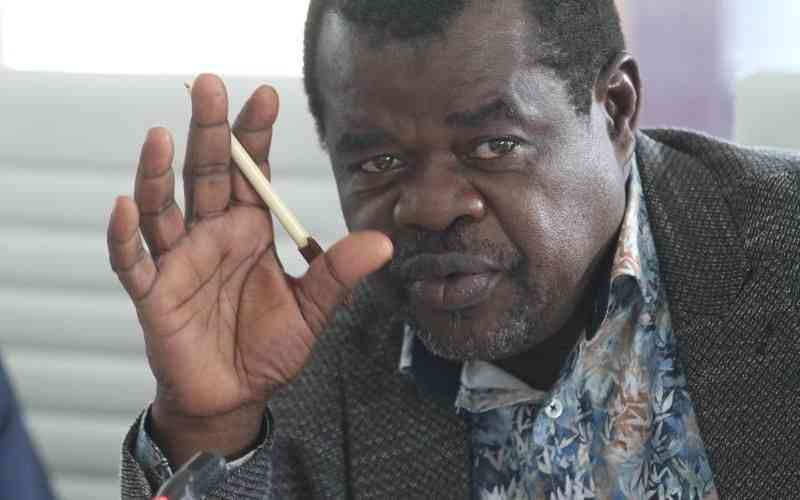
Others are Benjamin Furaha Dickson, Kafundi Masha, James Mukobo, Moses Muli Kingoo, Adan Mak Thulu, Robert Mwangi and Kazungu Kalama Jojwa.
Justice Mativo noted that all the petitioners were individually charged, tried and convicted of the offences under the above provisions and sentenced to life imprisonment and the mandatory minimum sentence prescribed by the said provisions.
"A declaration is and is hereby issued that the impugned minimum sentence is discriminatory in nature because they give differential treatment to a convict under the impugned provisions distinct from the kind of treatment accorded to convicts under other offences which do not impose mandatory sentences, so mandatory minimum sentences violate an accused right under Article 27 of the constitution," said Justice Mativo.
He said the extent the impugned provisions prescribe minimum mandatory sentences with no discretion to the trial court to determine the appropriate sentence to impose taking into account an accused individual circumstances and mitigation, such sentences fall foul of the right to a fair trial guaranteed in Article 50 of the Constitution.
"An order that persons convicted and imprisoned under the offences are at liberty to petition the High Court for mitigation and re-sentencing," said Justice Mativo.
He said the courts should have as far as possible have unfettered discretion in relation to sentencing.
"Infliction of punishment is pre-eminently a matter for the discretion of the trial court and to the extent that the provisions of sections 8(2), )3), (4), 11(1), 20(1) and 3(3) of the Sexual Offences Act take away the court's discretion, ignoring the fact that the individualisation of punishment requires proper consideration of the individual circumstances of each accused person," he said.
The petitioners said the mandatory sentence infringed on a fair trial guaranteed under Article 50 of the constitution and that they were being deprived the right to mitigate and a right to a lesser severe sentence unlike other offenders which amounts to discrimination contrary to Article 27 of the Constitution.
"That the mandatory nature of the sentences under the said provision jettison the discretion of the trial court forcing it to impose sentences which are pre-determined by the legislature contrary to the doctrine of separation of powers under Article 160(1) of the constitution depriving Magistrates sentencing discretion," said the petitioners in their submissions.
The petitioners said they were not challenging their convictions but questioning the constitutionality of the mandatory minimum sentence.
They said the sentences offend Article 14 of the International Covenant on Civil and Political Rights ICCPR and that the words 'shall' and 'not less than' in the said provisions confine the magistrates to sentences pre-determined by the legislature which offends the doctrine of separation of powers.
They said the provisions ignore the offenders' personal circumstances and that sentencing is a legal issue that forms part of the principle of a fair trial.
They prayed for an order for re-hearing their mitigation and sentencing depending on each petitioner's circumstances.
However, in response, the DPP has opposed the petition arguing that the petitioners' right cannot override the victims' right and that the mandatory sentence reflects the will of the people and the sentence deters similar offenders.
Stay informed. Subscribe to our newsletter
"The constitution recognizes children as vulnerable and children's rights are guaranteed under international conventions. The decisions relied upon by the petitioners did not invalid mandatory sentences," said the DPP.
The DPP said the court would be exceeding its jurisdiction were it to declare mandatory sentence unconstitutional and the courts have discretion to impose short or long sentences.
The Attorney General AG also said the rationale for the act was to protect all persons from unlawful sexual acts and preserve the integrity security and dignity of all persons and best interest of the child, incapacitate the offenders as a measure of protecting the victims.
The AG said that the Supreme Court had pronounced itself that the unconstitutionality of mandatory death sentence did not apply to sexual offenders and that allowing the petition would create havoc in the criminal justice.
 The Standard Group Plc is a
multi-media organization with investments in media platforms spanning newspaper
print operations, television, radio broadcasting, digital and online services. The
Standard Group is recognized as a leading multi-media house in Kenya with a key
influence in matters of national and international interest.
The Standard Group Plc is a
multi-media organization with investments in media platforms spanning newspaper
print operations, television, radio broadcasting, digital and online services. The
Standard Group is recognized as a leading multi-media house in Kenya with a key
influence in matters of national and international interest.
 The Standard Group Plc is a
multi-media organization with investments in media platforms spanning newspaper
print operations, television, radio broadcasting, digital and online services. The
Standard Group is recognized as a leading multi-media house in Kenya with a key
influence in matters of national and international interest.
The Standard Group Plc is a
multi-media organization with investments in media platforms spanning newspaper
print operations, television, radio broadcasting, digital and online services. The
Standard Group is recognized as a leading multi-media house in Kenya with a key
influence in matters of national and international interest.





